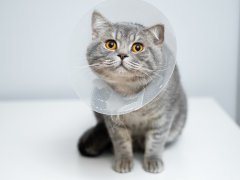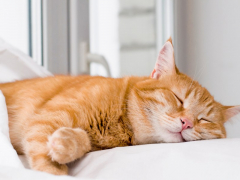It is common knowledge that smoking is bad for health: in the U.S., smoking is the leading preventable cause of death and disease.1
However, it is unclear whether pet owners realize the extent of health problems that can be caused in their pets by breathing in secondhand smoke, from the side effects of marijuana intoxication to the dangers of tobacco smoke.
Cats can take in toxic chemicals when exposed to second- and third-hand smoke from tobacco, e-cigarettes, and marijuana. When cats are exposed to marijuana they appear to become very agitated, dazed, and disorientated, which likely an unpleasant experience for them. Pet owners should keep all tobacco, electric cigarettes, and cannabis products out of cats' reach, and avoid smoking inside the cat's home environment. Key Takeaways
Cat owners should be aware of the potential effects on their cat’s wellness and health, and take responsibility to prevent harm.
1. Tobacco Smoke
People who smoke tobacco inhale the “first-hand smoke” into their lungs. “Second-hand smoke” is what is exhaled by the smoker, or smoke that is emitted from the end of the lit cigarette, cigar, or pipe. There’s also “third-hand smoke,” which is the small particles of chemical-laced smoke and tobacco that stick to furniture and flooring—and also pets’ fur. Cats are particularly susceptible to third-hand smoke due to their fastidious grooming habits.
Tobacco smoke contains thousands of chemicals, many of which cause toxicity and disease. This includes known carcinogens—chemicals that cause cancer. This second- and third-hand smoke still contains toxic chemicals and can be detrimental to our pet’s health, as well as affecting humans.
Cats’ exposure to second-hand smoke leads to an increase in respiratory diseases such as asthma and lung cancer.4 They are also twice as likely to develop a cancer called lymphoma than cats from non-smoking households.2 Lymphoma is a cancer of the lymph nodes, and the average survival time in affected cats is only around six months.
The intense grooming habits of our pet cats can be problematic for them if they live in a household with a smoker. Ingestion of third-hand smoke while grooming has been linked to an increase in an aggressive mouth cancer called squamous cell carcinoma.3
It is thought that while they groom, the mucous membranes on the inside of cats’ mouths are exposed to the carcinogenic chemicals in tobacco smoke, which is still dangerous despite being third-hand. Squamous cell carcinoma is highly aggressive, with a very low survival rate by one-year post-diagnosis.
These health conditions are serious and severe, and can cause considerable risk to your cat’s health. It is not protective enough to smoke in a well-ventilated room, steps should be taken to avoid exposure to passive smoke at all—preferably by not smoking at all inside the cat’s environment.
Particles can also be carried on clothing, and so although smoking outside will massively reduce the amount of second and third-hand smoke your cat is exposed to, it does not completely eliminate risk.
2. Vaping
Electronic cigarettes are becoming more popular, and are thought to be better for health than traditional tobacco cigarettes. So, is vaping a better alternative for pet owners?
There is no evidence that the fumes from e-cigarettes are dangerous to pets, but the vape cartidges themselves can be problematic. Pets can be attracted to their smell, as they are often flavored. The e-liquids contain varying amounts of nicotine. Cats can easily be exposed to toxic levels of nicotine through chewing on vape cartridges, but also through eating cigarette butts.
Symptoms of nicotine poisoning include drooling, vomiting, diarrhea, agitation, an abnormal heart rate (can be very low or very high), rapid breathing, very high or low blood pressure, disorientation, wobbliness, a drop in body temperature, and seizures.
Nicotine toxicity can be fatal if high enough levels are consumed. Ingestion of the e-cigarette case can also cause gastrointestinal blockages, and the batteries can cause severe internal burns.
Vapes can therefore be very dangerous to cats and should be kept in a secure and inaccessible place if they must be in the house. If your cat has been exposed to e-cigarette fluid, or the case or battery, seek an appointment with a veterinarian as an emergency.
3. Cannabis and Marijuana Smoke
Marijuana toxicity can cause incoordination, drooling, vomiting, urinary incontinence, altered heart rate and blood pressure, and in severe cases, seizures, coma, and possibly death. Photo credit: Elsa Olofsson, CBD Oracle
The term “cannabis” refers to all products made from the plant, Cannabis sativa. The word “marijuana” is often used interchangeably, but technically refers to the products of the cannabis plant that contain significant tetrahydrocannabinol (THC). This usually means the dried flowers, stems, leaves, and seeds. The terms may be used interchangeably in this article, as the effect on cats is relatable between the two.
Cannabis intoxication in cats can result from the ingestion of cannabis directly, or through eating edibles such as brownies (which are doubly toxic due to their chocolate content!). Pets can also be exposed to secondhand cannabis smoke if you smoke weed in their home environment.
The effects of marijuana on pets can be variable. Cannabis contains more than 100 different compounds, called cannabinoids, which have different effects on the body. Dogs and cats may have more cannabinoid receptors in the brain, which means they may have more extreme reactions to the drug.
In humans, the psychoactive elements of THC products produce a “high.” Some cats appear to become very agitated, dazed, and disorientated. This is unlikely to be a pleasant experience at all for our pets, and the loss of control will likely be very frightening and stress-inducing.
Additionally, marijuana can be toxic to cats. Symptoms include wobbliness and incoordination, drooling, vomiting, urinary incontinence, altered heart rate, and blood pressure. Severe cases may result in seizures, coma, and death.
If your cat has been exposed to THC products, including edibles, take them to a veterinarian. It is important to be honest with your vet. They will be purely focused on your pet, and accurate diagnosis is essential for treatment. The fatal dose of cannabis is high; with appropriate care, most cats will make a full recovery.
4. CBD Oil
CBD stands for cannabidiol, another compound found in the cannabis plant. Unlike THC products, however, CBD does not have an active psychoactive effect (the “high”). CBD is often used medicinally, with reported improvements in conditions such as epilepsy and arthritis. However, there is a marked lack of scientific evidence as yet—for both efficacy and safety.
CBD oil appears to be fairly safe in cats, although higher doses have been reported to cause tummy upsets and excessive drowsiness. Concerningly, the quality of the CBD seems to vary extensively with the source. If you are considering the use of CBD oil in your cat, perhaps for a specific medical condition, discuss it with your veterinarian first.
Catnip is extremely safe for cats despite the fact that it gives cats a “high.”
The health concerns around smoking are widely publicized in people, and need to be highlighted in pets as well. Tobacco and cannabis are not just like catnip, despite widespread myths. Cats get “high” with catnip, but it is extremely safe, whereas both tobacco and marijuana have well-documented adverse effects.
Blowing smoke into your cat’s face is never acceptable, but pet owners should take full responsibility and ensure their precious felines are never exposed to toxic chemicals, even passively. Keep all tobacco, electric cigarettes, and cannabis products well out of reach of curious cats, and seek veterinary advice immediately if there is known or suspected exposure.
Also Read: What Does Catnip Do To Cats & Why Cats Like It?
Frequently Asked Questions
Is it bad to smoke near cats?
Yes, cats can take in toxic chemicals from passive smoking. Tobacco smoke can cause respiratory disorders and various cancers. Marijuana smoke can cause unpleasant symptoms such as disorientation, vomiting, changes to heart rate and blood pressure, and even seizures.
Can smoke get cats high?
Cats can suffer from cannabis intoxication. This is mostly characterized by unpleasant symptoms such as drooling, vomiting, urinary incontinence, and agitation. It can be serious, causing changes to heart rate, and blood pressure and even leading to seizures and coma.
What happens if you smoke in front of a cat?
Smoking around cats leads to them inhaling and ingesting second- and third-hand smoke. This can cause a variety of health problems dependent on the type of smoke, from asthma to cancers, disorientation, vomiting, and urinary incontinence. It is recommended to smoke well away from cats, preferably outdoors.
-
FDA: https://www.fda.gov/animal-veterinary/animal-health-literacy/be-smoke-free-and-help-your-pets-live-longer-healthier-lives#Endnotes accessed 28/11/22
-
https://academic.oup.com/aje/article/156/3/268/71617%20 accessed 28/11/22
-
https://journals.sagepub.com/doi/full/10.1354/vp.41-3-209 accessed 28/11/22
-
https://bvajournals.onlinelibrary.wiley.com/doi/abs/10.1136/inpract.29.3.138 accessed 28/11/22










